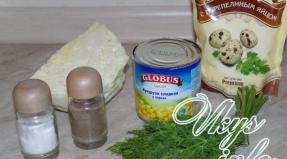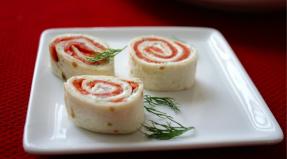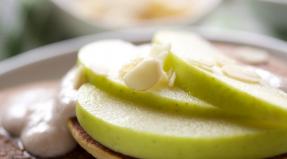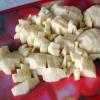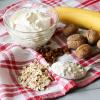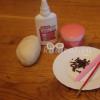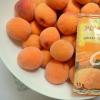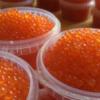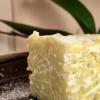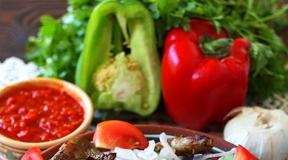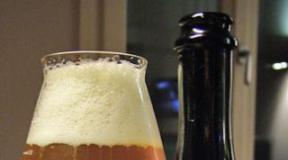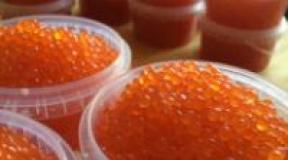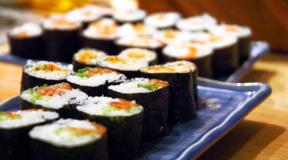Freshly squeezed juices can be dangerous. Who should not drink and which ones? Freshly squeezed juices - vitamins that are not useful for everyone
Freshly squeezed vegetable juices are famous for their high content of vitamins and other nutrients. They are also a source of easily digestible carbohydrates. In this article, we will look at the benefits of natural drinks. Depending on the product from which they are prepared, the juice will have one or another useful property.
Freshly squeezed vegetable juices
Vitamins and Minerals: easily digestible carbohydrates, vitamins C, PP, folic acid and amino acids, salts of potassium, sodium, calcium, magnesium, iron, special antiulcer vitamin U.
Useful properties of cabbage juice: in the presence of stomatitis and sore gums, it will be very useful - rinse your mouth with juice. Cabbage vegetable juices taste fresh. But in no case do not salt it, otherwise all its benefits will be lost.
Contraindications for cabbage juice: in the presence of gastritis and ulcers of the stomach and duodenum.

Vitamins and Minerals: beta-carotene, B vitamins, potassium, calcium, cobalt.
Useful properties of carrot juice: good for children as it promotes their growth and healthy development. Strengthens the immune system, improves vision, and helps fight skin diseases. To improve milk, nursing mothers are advised to drink up to 0.5 liters of carrot juice.
You should not overuse the juice, because the excess of beta-carotene, which it contains, has a detrimental effect on the liver. To get enough vitamins from the drink, drink only 0.5 glasses a day.
Contraindications for carrot juice: with ulcers and enteritis.

Vitamins and Minerals: vitamins C, P, B1, B2, PP, potassium, iron, manganese salts.
Useful properties of beetroot juice: forms red blood cells, which has a beneficial effect on the process of improving the condition of the blood. Vegetable juices from beets cleanses the human body of toxins.
Despite its beneficial properties, the drink will not taste good to many. Therefore, it is better to start drinking beet juice with a small amount - 1 tsp, and gradually reach 100 g. Also, the juice can be mixed with other vegetable juices (while the beet juice should not exceed 1/3). For example, with carrot or pumpkin. In addition, such a mix will be saturated with phosphorus and sulfur, potassium and other alkaline compounds.
The drink also contains harmful substances that are destroyed in the air. Therefore, it is recommended to leave freshly squeezed beet juice in the refrigerator for 3 hours in an open container before drinking.
Contraindications for beetroot juice: do not drink for people who have kidney problems, in the presence of ulcers and individual intolerance.

Vitamins and Minerals: beta-carotene, vitamins B, C, tocopherol, nicotinic acid, sodium, potassium, calcium, phosphorus, magnesium, iron, copper, zinc, manganese, selenium.
Useful properties of celery juice: the drink perfectly cleanses the body: it removes accumulated toxins and toxins. Improves blood condition, increases hemoglobin, lowers cholesterol levels. It also strengthens the nervous system, helps to cope with stressful situations, and has calming properties. In addition, it increases the efficiency and general tone of the body.
Contraindications for celery juice: with ulcers, after 6 months of pregnancy and the elderly.

Vitamins and Minerals: vitamins A, PP, B, C; zinc, magnesium, chlorine, cobalt, iron, molybdenum, calcium, potassium, selenium, manganese, sulfur.
Useful properties of tomato juice: advise to drink to patients suffering from diseases of the cardiovascular system.
The drink "stirs up" the stomach and reduces the likelihood of the appearance of cancer cells. Tomato juice will also be useful for expectant and lactating mothers. Since the juice is low in calories, it is perfect for overweight people. Two glasses of tomato juice contains the daily requirement for vitamins C and A.
Many people like to salt tomato juice, but this "kills" its beneficial properties. If you want to add flavor to the juice, replace it with chopped garlic or herbs (fresh parsley, cilantro, celery and dill will do). Don't overdo it with garlic!
Contraindications for tomato juice: do not drink tomato juice with exacerbation of gastritis, peptic ulcer, pancreatitis, cholecystitis. Contraindicated in case of poisoning of any severity.

Vitamins and Minerals: vitamins C, B1, B2, B6, E, beta-carotene, sucrose, useful pectin substances, salts of potassium, calcium, magnesium, iron, copper, cobalt.
Useful properties of pumpkin juice: stimulates the stomach, promotes bile secretion. The juice will be very useful for people suffering from diseases of the kidneys, liver and heart. Helps with insomnia.
The daily rate of pumpkin juice is 0.5 cups per day.
Contraindications for pumpkin juice: with individual intolerance.

Vegetable juices are very beneficial for human health. They are able to treat many diseases and have a rejuvenating effect.
What juice do you like the most?
Do you know how to drink freshly squeezed juices correctly? It is known that all phytonutrients from them begin to volatilize immediately after preparation. And vitamin C, in contact with the metal parts of the juicer and the air, is completely destroyed within half an hour. That is why such juices should be drunk immediately! The only exception is the beetroot drink.
In the sunny south
While vacationing in Crimea, many pay attention to the sale of fruits. For example, in the city of Yalta, in the central market, sellers sell pomegranates and, at the same time, immediately make fresh out of it on the spot. People ask them to make them juice from this delicious fruit and drink it within a couple of minutes. Some buy and immediately consume a ready-made drink that has stood on the counter in the sun for an unknown amount of time.
There are customers who buy juice with the words "I'll go home tomorrow and take them for children as a gift." Apparently, they do not know how to drink freshly squeezed juices correctly. After half an hour, all the vitamins in them disappear, they begin to turn sour and turn into a favorable environment for the reproduction of bacteria. What will they bring to the kids? A dark red liquid with germs?
Fresh
And how to drink fresh juices correctly? Consuming these beverages provides an effective and easy way to obtain your daily vitamin intake from fruits and vegetables. Since there is no fiber in fresh juices, fructose from it is absorbed by our body very quickly, which can disrupt the sugar balance in the blood.
Drinks made from vegetables (with the exception of carrots and beets) do not have this negative effect. Therefore, doctors advise to consume more vegetable juices and limit the intake of fruit juices to one glass per day.
It is known that one glass of juice can be prepared from 3-4 oranges, which in its composition will contain up to 8 tsp. Sahara.
Experiments
Not everyone knows how to drink freshly squeezed juices correctly. You shouldn't be afraid to experiment. Most people do not want to mix these juices. But it is known that it is necessary and possible to combine them. Not everyone can drink pomegranate or lemon juice because of the sweetness and acidity. When mixed with others, they make a delicious cocktail of minerals and vitamins.

Of course, not all drinks can be combined thoughtlessly. Many of them ferment when combined. By the way, sugar and salt cannot be added to fresh juice. If the juice tastes too sour, add a little honey to it, and if it is sweet, dilute it with another juice or water.
Use
Are you interested in the question of how to drink freshly squeezed juices correctly? Do not try to consume them during breakfast or right after breakfast. Fresh is a concentrate of active substances. He begins to wander, reacting with food. As a result, a person develops bloating, heartburn, and many side symptoms of flatulence. In addition, he asks himself, "What have I eaten?" There is a simple answer to this question: fresh must be consumed on time.
With high acidity, you need to drink such drinks an hour after breakfast or lunch, and with low acidity, an hour before meals.
Several rules
Nobody taught you how to drink freshly squeezed juices in the morning? Let's try to understand this issue. All fruits and fruits should be eaten on an empty stomach. After all, the fruits are digested in the small intestine. If there is a lot of food in the stomach, then, upon reaching it, the fruits fall into the trap and begin to ferment.
Not everyone can start the day with a glass of citrus juice. Each of us has our own ailments - some morning intake of this drink will benefit, and others - complications! For example, people with gastritis or ulcers are not allowed to consume citrus juices on an empty stomach. This rule also applies to those who have a sore gallbladder or pancreas.

One of the sugary drinks is pineapple juice. That is why it is impossible to lose weight with it. It breaks down proteins, not fats. Nevertheless, it contains a colossal amount of amino acids that improve human digestion.
Medical statements
Doctors say that drinking juices that have not been sterilized is unhealthy. They claim that raw fruits and vegetables contain pathogenic microbes that can cause diarrhea, vomiting, and even kidney failure. Doctors do not recommend drinking freshly squeezed and pregnant women.
In sterilized drinks sold in stores, not only harmful microorganisms are absent, but also "live" vitamins. Think for yourself, what can be left after heat treatment? Moreover, such drinks contain various dyes, preservatives, flavor enhancers and other food additives.
Apple product
Now let's find out how to drink freshly squeezed juice. Many practitioners believe that the most useful cocktail is an apple-carrot drink. It is well absorbed by the body, enriches it with carotene and iron. Fruit sugar in combination with trace elements found in vegetables is of great benefit to humans.

If your stomach reacts negatively to juice, try diluting it with water in a proportion that is harmless to you. The simplest recipe is to take a freshly prepared apple drink 30 minutes before breakfast (about half a glass).
In addition, you can make any cocktails from vegetable juices, taking apple as a basis.
Beet
It is rare where you can find information on how to properly drink freshly squeezed beet juice. We will tell you about it now. Beets can be stored for a long time, so they can be juiced all year round. The tops of this root vegetable are also useful, and many squeeze life-giving moisture out of it. To obtain a healing drink, a red beet variety is suitable, which does not have white streaks. The extracted juice is kept in the refrigerator for several hours, the foam is removed from it and mixed with carrot in a ratio of 1: 4.
Pure beet juice can cause unpleasant reactions: dizziness, nausea, diarrhea. Thus, it cleanses the body. Experienced people are convinced that it is better to start drinking mixtures with those in which carrot juice predominates. They say that the proportion of beetroot should be increased gradually. Instead of carrot juice, you can use pumpkin juice.

If a person wants to be treated with beets, then he should take one glass of the mixture twice a day. When his body gets used to it, you can start drinking pure beet juice. It should be taken up to two weeks, then take a break for the same time, and then repeat the course again.
If a person is healthy, he can use beet juice with lemon, carrot, currant, tomato, apple, pumpkin. You can add honey, kefir or bread kvass to the mixture.
Some people mix 50 ml of beet juice with the yolk of one egg and 4 tsp. Sahara. Then a couple of pickled cucumbers are chopped on a fine grater and the resulting substance is added to the mixture. Then the cocktail is salted to taste and half the glass is filled with it. After adding a little lemon, mix and cool. The drink is served on the table, adding parsley, ice and green onions on top. This amazing dish is eaten with a spoon.
Carrot product
Did your grandmother tell you how to drink freshly squeezed carrot juice? First you need to remember that such a drink retains its useful qualities for a very short time. Therefore, it is important to drink it immediately after preparation. This juice should not be prepared from evening to morning, since there is no point in storing it even in the refrigerator. It must be prepared immediately before use.

If you wish to store your carrot juice, you can freeze it. As a result, it will retain all its useful vitamin composition unchanged.
Carrot juice can be combined with meals containing vegetable and animal fats. Thus, all of its useful components are fully assimilated in the body. You can simply add a little yogurt or sour cream to the drink. But starchy or flour dishes should not be combined with it.
You can add orange, beetroot, apple, or pumpkin juice to the cup to improve the taste of the carrot juice.
Grapefruit
You can't find information on how to drink freshly squeezed grapefruit juice anywhere? We will help you figure it out. Grapefruit juice is used both for the prevention of ailments and in their complex treatment. If your digestion is disturbed, your intestines are weak, you suffer from hypertension, you should add a little honey to this drink and drink it in half a glass 30 minutes before meals.

So, now you know not only how to properly drink freshly squeezed juice from beets and other healthy vegetables and fruits, but also how to consume these drinks. What is the healthiest freshly squeezed juice? The one that you liked the most. Therefore, experiment - come up with your own unique recipes, mix, combine vegetables and fruits. Vegetable and unsweetened juices are recommended to be consumed up to 3 glasses a day, and sweet fruit juices - no more than one glass. And now let's list the rules for taking the most famous drinks:
- juice from apricots can be drunk 2 hours before meals (it is prohibited for those who have diabetes mellitus);
- orange juice should not be drunk on an empty stomach;
- pineapple is taken with meals (it should not be consumed by those who suffer from peptic ulcer disease or gastritis);
- cherry is drunk to bind fat during meals (it is prohibited for those who suffer from stomach ulcers and high acidity);
- grape juice is taken 2 hours before meals (it is prohibited for those with chronic bronchitis and diabetes mellitus);
- juice from pears is consumed 10-15 minutes before breakfast or lunch (it should not be drunk by pregnant women and those who have colitis);
- pumpkin, tomato and black currant juice can be drunk whenever you want;
- plum is taken with meals for weight loss;
- potato should be eaten between meals, excluding fish and meat products for this period;
- with the help of cabbage juice, you can lose a couple of kilograms in 2-3 weeks and cure an ulcer (you need to drink 1 liter in small portions during the day).
Freshly squeezed juice in our minds is always a healthy, wholesome, tasty, necessary product, in a word. The more curious is the opposite opinion / Like, fresh juice is sometimes harmful, moreover, it can lead to diabetes mellitus.
Whether it is true or not, I decided to search in the net. Diabetes is, of course, absurd, at least as endocrinologists and gastroenterologists assert. Freshly squeezed juices of vegetables and fruits have tremendous cleansing and restorative power, have natural structured water, dyes, internal charge, essential oils, organic acids, alkalis, vitamins, microelements, phytoncides. Vegetables and fruits are essential in our diet and therefore in our health. They serve as a source of not only vitamins and mineral salts, but also contain fiber, organic acids, pectin compounds, aromas and essential oils. They contain a large amount of vitamins B, B2, B6, E and A. In addition, they have medicinal properties for the treatment of many diseases. And also, freshly squeezed juices are consumed 100% in the body, unlike fresh fruits and vegetables. With an electric juicer, they are easy to prepare and enjoyable to use.
- First group. Vegetables and fruits that deliver mainly vitamin C to the human body, as well as minerals, sugar, fiber, vitamins A and B.This group includes tomatoes, lemons, oranges, grapefruits, cabbage (especially sauerkraut), currants, gooseberries, forest berries, peppers, raspberries, strawberries, parsley.
- Second group. Vegetables and fruits that supply the body mainly with carotene. Vegetables and fruits of this group also supply minerals, vitamin C, sugar, fiber, vitamin B2. This group includes carrots, tomatoes, melon, apricots, pumpkin, leeks, Brussels sprouts, green pea pods, beans, parsley, red peppers, mountain ash.
- Third group. Vegetables and fruits containing a small amount of minerals and vitamins that are soluble in water and have a positive effect on the body's metabolism (vitamin C and B vitamins). This group includes beets, cucumbers, celery, onions, radishes, parsley, apples, pears, plums, cherries and grapes.
Apricot juice

Apricot juice is rich in potassium, which strengthens the heart muscle and helps remove excess fluid from the tissues. But diabetics are not recommended to drink this juice - there is too much sugar.
Pineapple juice

The best of the best juices for women, weight gainers, fitness, dieters, rejuvenators. Pineapple juice contains bromelain, a natural fat-burning and rejuvenating agent. Pineapple juice is also useful in the treatment of sore throats and kidneys, is indispensable for chills and stress, has an excellent effect on the work of the pancreas, removes fluid from the body, which helps in the prevention of cellulite (which, as we know, is not a disease at all).
Pineapple contains only 48 Kcal per 100 g of fruit. Pineapple juice is recommended to drink for edema and thrombosis. Drink and lose weight, but remember that everything is good in moderation.
But do not forget that pineapple juice in large quantities is harmful to people with diseases of the gastrointestinal tract.
Orange juice

This is a storehouse of vitamin C, so it must be drunk in the cold season for the treatment and prevention of colds, as well as vitamin deficiency. Orange juice helps to tone up, relieve fatigue and strengthen blood vessels. Doctors recommend drinking orange juice for liver diseases, atherosclerosis and hypertension. Thirst-quenching orange juice is one of the lowest calorie juices available.
Grape juice

Grape juice contains significant amounts of sugar and potassium. It is recommended for nervous exhaustion and loss of strength. Dark grape juice contains substances that reduce the risk of heart disease. It also has bactericidal, diuretic, laxative, diaphoretic and expectorant effects.
Grape juice is not recommended for gastritis with high acidity, gastric ulcer and duodenal ulcer, diabetes mellitus, obesity, chronic inflammatory processes in the lungs. It is undesirable to use grape juice and with a tendency to flatulence. For medicinal purposes, natural grape juice should be drunk half a glass three times a day for three weeks. Before taking it, it should be diluted with water in a 1: 1 ratio.
Cherry juice

Improves blood composition, strengthens the walls of blood vessels, relieves inflammation, rejuvenates the body, helps with constipation, improves metabolic processes, improves appetite, is used as an expectorant.
Pomegranate juice

The advantages of pomegranate juice are undeniable - it contains more antioxidants than even green tea. Pomegranates are rich in potassium, vitamin C and vitamin B (niacin). Pomegranate juice increases hemoglobin levels, increases appetite and regulates stomach activity. Serves as a diuretic, anti-inflammatory, antiseptic and even anesthetic, in addition, it increases the human body's resistance to radiation. Recommended for pregnant women to drink, especially in combination with carrot and beetroot juices
Contraindicated in gastric ulcer, gastritis with high acidity and pancreatitis. In any case, it is recommended to drink pomegranate juice diluted with water, since it contains many acids that irritate the stomach lining and destroy tooth enamel.
Grapefruit juice

Rich in vitamin C and grapefruit juice. Helps with stress, overwork, high blood pressure, liver disorders, lack of appetite, insomnia, poor digestion.
Contraindications are typical for all citrus juices: stomach or duodenal ulcer, intestinal upset, gastritis with high acidity or pancreatitis.
Pear juice

Pear juice is a good diuretic and has a bactericidal effect on the entire body. Recommended for people with a tendency to diseases of the circulatory system and kidney problems. This product contains a large amount of pectin compounds that improve bowel function and digestion in general.
Pear juice is rich in sorbitol, which is useful in the prevention and treatment of vascular diseases. It is also indicated for obese people, as it regulates digestion, has an antiseptic, antibacterial and analgesic effect. Pear juice is recommended as an antipyretic agent for neuritis and cystitis, as an astringent, strengthening and wound healing agent.
Cabbage juice

Cabbage juice contains easily digestible carbohydrates, vitamins C, PP, folic acid and amino acids. It also contains a special antiulcer vitamin U. In this regard, it is used warm as a means for the prevention of exacerbations of gastric ulcer and duodenal ulcer. It is recommended to rinse your mouth with warm freshly squeezed cabbage juice in case of stomatitis and gum disease.
In addition, cabbage juice inhibits the conversion of carbohydrates into fats, therefore it is useful for obesity. You can drink it 30 minutes before meals and between meals several times a day.
Despite the fact that cabbage juice has a healing effect on the gastric mucosa, it is undesirable to drink it in the midst of an exacerbation of gastritis and ulcers.
Kiwi juice

Kiwi juice helps with heart disease by burning fats that form blood clots and block arteries. Norwegian doctors recommend drinking kiwi juice every day. It was found that a kiwi juice diet helps to reduce the risk of blood clots by 18% after 28 days and reduce the level of fatty acids in the blood by 15%.
Vitamin C in 1 glass of freshly squeezed kiwi juice will replenish the daily need for an adult. Therefore, cardiologists recommend kiwi juice as an alternative to cardio-aspirin.
People who are prone to allergic reactions should be careful with kiwi juice.
Red currant juice

Lemon juice

Rich in vitamin C, potassium, silicon and sugar (odd as it may sound). Recommended for vitamin deficiency (mixed with warm water and honey). Lemon juice can help maintain mental balance, for example, before an exam or difficult, unpleasant conversation, performance, drink a cocktail of lemon juice and water. It will also help improve memory, brain activity, concentration.
Carrot juice

Carrot juice is considered the elixir of youth. It contains a lot of carotene, vitamin E, various trace elements. Drinking such juice regularly, you will improve your appetite and digestion, strengthen your teeth and nervous system, increase the body's resistance to infections, improve vision, cleanse the body. Carrot juice is especially necessary for young children as a multivitamin that improves their development.
Carrot juice is indicated for: atherosclerosis, myocardial infarction, thyroid diseases, dermatitis, eczema, urolithiasis.
You should not abuse carrot juice, since with an excess of carotene in the body, the skin acquires a yellowish tint. In addition, due to the excess of the same beta-carotene, the liver is overloaded. For vitamin prevention, half a glass will be enough.
Sea buckthorn juice

The sea buckthorn bush in the garden is a factory for the production of biologically active substances. Sea buckthorn juice contains almost all fat and water soluble vitamins, sea buckthorn berries are rich in nitrogenous substances, sea buckthorn is one of the natural sources of vitamin E, it contains many minerals necessary for the human body.
Due to its rich chemical composition, sea buckthorn juice has a wide range of medicinal properties: it is used in the treatment of gout, rheumatism, scurvy, tumors, diseases of the digestive tract, metabolic disorders, hypovitaminosis and some skin diseases. Sea buckthorn juice is tasty and healthy. But sea buckthorn juice is also the basis for the preparation of a very valuable medicinal product - sea buckthorn oil.
To prepare sea buckthorn oil from berries, squeeze the sea buckthorn juice and keep it in a cold place. The oil floats when standing, and it must be very carefully removed with a spoon (or carefully drained). This oil is considered to be of the highest quality.
ATTENTION! Sea buckthorn oil (as well as freshly prepared juice) should not be taken by people with acute cholecystitis and diseases of the pancreas
Beet juice

Beet juice contains a large amount of vitamins, amino acids, sugars, iodine, iron, manganese. Freshly squeezed juice from beets helps to improve blood composition, cleanse the liver, kidneys, blood vessels, gallbladder, increase resistance to viruses, stimulate the lymphatic system, restore strength, improve memory, expand blood vessels. Fresh beetroot is the best natural remedy for the treatment of hypertension, strengthening the nervous system with neurosis and insomnia, and improves overall well-being.
It should be borne in mind: in freshly squeezed juice from beets, there are harmful compounds that are destroyed when they come into contact with air. Therefore, before use, beet juice must be left to stand in the refrigerator in an open container for at least 2-3 hours.
For some people, beetroot juice is contraindicated. Sometimes it causes nausea, vomiting, dizziness, heart palpitations, and general weakness.
Celery juice

The most valuable property of raw celery is that it contains an exceptionally high percentage of (live) biologically active organic sodium. One of the chemical properties of sodium is to keep calcium dissolved.
Celery juice contains four times more organic sodium than calcium. This fact makes it one of the healthiest juices for people who consume concentrated sugars and starches more or less consistently throughout their lives.
Also, dry, hot weather is easier to tolerate if you drink a glass of celery juice in the morning and the same amount in the afternoon, before eating. This normalizes the body temperature and we feel great.
A mixture of celery juice with other juices is very useful and gives almost phenomenal results in cases of vitamin deficiency and other ailments. The discovery of the action of these mixtures and recipes has brought invaluable benefits to patients with weight of all ages.
In case of nervous disorders, which are the result of degeneration (degeneration) of the nerve sheath, the use of carrot and celery juices helps to restore them.
Celery juice is very rich in magnesium and iron, and it is this combination that is very valuable as "nutrition for blood cells. Many diseases of the nervous and circulatory system are mainly the result of the introduction of inorganic mineral elements and salts into the body.
Celery and carrot juice provides the perfect combination of these organic substances to prevent these diseases and restore the body in case these diseases already occur.
Plum Juice

Fresh plums are very useful for people with diseases of the gastrointestinal tract. It contains a lot of potassium, which removes water and table salt from the body, and therefore is especially recommended for those suffering from rheumatism and gout. But, again, for people suffering from flatulence and constipation, juice from plums is not recommended.
Tomato juice

Tomato juice stimulates the work of the gastrointestinal tract, boiled reduces the risk of cancer. It is very useful for pregnant and lactating women. Due to its low calorie content, it can be safely drunk by overweight people. Best of all, tomato juice should be taken 20-30 minutes before meals, as it increases the readiness of the stomach and intestines to digest food.
However, it is better to refuse tomato juice in case of exacerbation of gastritis, peptic ulcer, pancreatitis and cholecystitis.
Pumpkin juice

Pumpkin juice is useful for kidney and liver diseases, insomnia, metabolic disorders, diabetes mellitus, kidney and bladder stones. For men suffering from inflammation of the prostate gland, traditional medicine advises drinking a glass of pumpkin juice daily for 2-3 weeks.
It cleanses the kidney-bladder system, stimulates their work, removes excess fluid, facilitates urine excretion.
Pumpkin juice is unusually rich in vitamins (in particular, carotene), potassium, phosphorus, magnesium, iron, organic acids and at the same time contains little fiber (like pumpkin), which makes it very useful for all gastroenterological diseases. You can consume it in unlimited quantities. Pumpkin juice pectins remove excess cholesterol from the body. In addition, as it turned out, ordinary pumpkin juice has a detrimental effect on microbacteria. You need to drink it half a glass every day all year round, half an hour before meals. This juice goes well with apple and carrot juice.
Blackcurrant juice

Regulates carbohydrate metabolism, increases sweating, relieves inflammation, soothes the nerves. Destroys influenza viruses, improves immunity. Used for vitamin deficiency, anemia, gastritis with low acidity, acute bronchitis, flu, sore throat.
Apple juice

Apple juice contains a minimum amount of calories, helps to remove kidney stones, contains a lot of iron and is useful for anemia. Apples are rich in pectin substances that can act as adsorbents that cleanse the body of toxins, which makes apple juice indispensable for various diets and fitness.
Apple juice should be consumed by people with frequent bronchitis, lung problems, and smokers. It is recommended for atherosclerosis, diseases of the liver, bladder, kidney, urolithiasis. In addition, apple juice normalizes bowel function ...
Apple juice will be of great benefit if you mix it with other juices: carrot, orange, celery - fruit juices are rich in sugars, and vegetable juices contain a large amount of mineral salts. Therefore, they serve as a good complement to each other. Without harm to health, you can drink up to one liter per day.
However, apple juice is contraindicated in exacerbation of gastritis, peptic ulcer and pancreatitis.
As you can see, even such a healthy product as fresh juice may not be useful for everyone and not always. Therefore, leading gastroenterologists recommend to all those who have problems with the gastrointestinal tract, liver, kidneys, and, of course, those who suffer from allergies, before getting addicted to any juice, be sure to consult a doctor and remember a few simple rules:
- You need to consume freshly prepared juices immediately (except for beetroot). Otherwise, they quickly (in 1-2 minutes) oxidize from air, scattered light and lose their activity. Such juice is ineffective for cleansing the body. Even short-term storage in the refrigerator accelerates fermentation and spoilage of food, although the taste may not change.
- Canned juices are less active than fresh ones.
- The fruit must be ripe.
- It is necessary to consume juices of fruits and vegetables, as well as their mixtures, a few minutes before meals. They quickly pass the stomach and are absorbed in the intestines in 15-20 minutes.
- After taking juices, many may experience a certain reaction of the body, anxiety, indigestion. All this is natural and indicates a cleansing process.
- You can drink juices as much as you want. During the day, it is necessary, to obtain noticeable results, drink at least 600 g.
- Since vegetables and fruits are often contaminated with microbes and sometimes with chemicals (plant protection products), pepper processing should be done very carefully. Pay special attention to tubers, which are very polluted by the soil and the microbes in it. Wash tubers with a brush.
- It is better not to peel fruits and vegetables, since most of the vitamins are concentrated under the peel itself.
- Juice intake is a kind of medical procedure, so drink the juice without haste, in a relaxed atmosphere. In no case should you drink the juice in one gulp, in large sips, like water. The juice is drunk slowly, in small sips, as if absorbing it in the mouth. It is advisable to drink the juice through a straw.
- It is undesirable to add salt or sugar to the juice. To improve the taste, juices can be seasoned with honey, finely chopped parsley or dill, lemon or orange zest, and caraway seeds.
Juice prevention, or what else you need to know about juice ...
Freshly squeezed fruit and vegetable juices complement each other perfectly. Fruit juices are richer in sugars and vitamins, and vegetable juices are richer in mineral salts.
Juices are best consumed 30-40 minutes before meals or in between meals. This recommendation should be followed especially carefully for juices made from sweet fruits. Drinking sweet juice in the afternoon can increase intestinal fermentation and cause bloating.
Freshly prepared juices (with the exception of beetroot - it must be kept for at least two hours) should be drunk immediately. Even short-term storage in the refrigerator reduces the medicinal value of the juice, although the taste may not change.
The benefits of freshly squeezed juices cannot be overstated. However, in order to get self-interest from them, you need to know the main rules of their use. In this article, we will consider how fresh juices are useful, when it is better to drink freshly squeezed juices, how to drink juice correctly and possible side effects.
The benefits of drinking fresh juices
Freshly squeezed juices bring many benefits to the human body. First of all, it is a real storehouse of vitamins and useful elements. During culinary processing, fruits and vegetables lose almost half of the useful elements, and they are 100% retained in the squeezed juice from fresh products. In addition, in this form, they are better absorbed by the body.
Some of the most important properties of fresh juices include:
- saturation of the body with a vitamin complex;
- cleaning from slags and toxins;
- strengthening the immune system;
- give vivacity and energy;
- improve digestion;
- improve appetite;
- accompany an increase in hemoglobin;
- some juices (cucumber, grapefruit, apple, pineapple, tomato) promote the breakdown of fats and are therefore recommended for those wishing to lose weight;
- promote the removal of excess fluids from the body, etc.
The specific benefits of freshly squeezed juice depend on which fruit or vegetable it is made from.
Did you know? To achieve a complex effect, you can combine several components in one juice. One of the most useful is the juice from carrots, beets, pumpkins and apples. Before preparing combined juices, it is imperative to check the compatibility of the products.
How to drink freshly squeezed juices
In order for fresh to benefit the body and not to harm, you need to know how to drink natural juices and when it is better to drink fresh. The most important rules on how to consume freshly squeezed juices include the following:

- the drink should be consumed immediately after it has been squeezed out, since vitamins are quickly destroyed;
- with the daily use of most fruit juices, it is imperative to add fiber to the diet, otherwise fructose, which such fresh juices are rich in, can disrupt the sugar balance in the body;
- vegetable juices, with the exception of beet and carrot juices, do not lead to an increase in sugar levels in the body;
- do not consume more than a few glasses of fresh fruit per day;
- do not combine freshly squeezed juices with food, this can lead to heartburn, bloating, flatulence, indigestion;
- before drinking fresh juice, it is necessary to exclude the presence of contraindications for health reasons, for some diseases, fresh juices are contraindicated;
- Before juicing, be sure to wash fruits and vegetables well;
- drink juice preferably from a glass container.
Important! Beet juice, unlike other fresh juices, must be insisted in the refrigerator for about two hours before use. Otherwise, the volatile substances it contains can cause nausea and vomiting.

When to drink fresh juices
In addition to the guidelines on how best to take juices, it is important to know the best time to drink fresh juices to get more benefits. Very often, lovers of fresh juices wonder when to drink freshly squeezed juices - in the morning or in the evening, or it doesn't matter.
You need to drink fresh juices before lunch. In this case, freshly squeezed juice in the morning should not be consumed on an empty stomach. Drinking freshly squeezed juice on an empty stomach can irritate the mucous membrane of the digestive system, repeated violation of this rule will lead to the development of gastritis or ulcers. Also, do not drink food with juice. Fresh fruit is taken 15-20 minutes before or after a meal.

At lunchtime and in the evening, it is better to refuse freshly squeezed juices, especially fruit and berry juices. If you want to know why you can't drink freshly squeezed juice at this time, it's because they are high in fructose. An excess of easily digestible carbohydrates will lead to rapid weight gain. In addition, fresh juices can be compared with an energy drink in terms of their effectiveness: having drunk such a drink at night, you can suffer from insomnia. Overweight people should not consume sweet juices more than once a day.
Did you know?
As for how to drink vegetable juices correctly, whether vegetable juices are healthy and when to drink them, the same rules apply for such juices as for fruit juices, with a few exceptions. Vegetable juices are also very healthy. In addition, such fresh juices, except for beet and carrot, do not lead to an increase in the amount of sugar in the body, and therefore they can be consumed several times a day. Due to the fact that juices from vegetables carry a large charge of energy, you need to drink them before lunch. An exception is tomato juice, which can be enjoyed before dinner. Potato juice is the only beverage that can be taken on an empty stomach for medicinal purposes. The rest are consumed half an hour before or after meals.
What can freshly squeezed juices be diluted with?
Let's clarify how to improve the efficiency of freshly squeezed juices and how to drink them correctly for this purpose. Let's list the most important rules:
- juices with a high acidity level are best diluted with water in a 1: 3 consistency;
- the addition of a teaspoon of cream to the fresh juice helps to improve the absorption of vitamins A, K, E, D by the body, especially for pumpkin and carrot fresh. For juices with high acidity (for example, apple, orange), this rule is not suitable, since adding cream to them can lead to curdling of the liquid and the formation of lumps;
- to reduce calorie content, you can add a little bran to freshly squeezed juices;
- the addition of honey or spices (cinnamon, turmeric, nutmeg) will add piquancy to fresh drinks.
Did you know? 250 ml of freshly squeezed orange juice contains the amount of fructose equivalent to eight teaspoons of sugar.

The healthiest fresh juices
Juice can be obtained from any vegetable, fruit and berry. Each type of juice has its own set of useful substances and affects the human body in its own way. It should be borne in mind that if a person has some diseases, juice can be beneficial in one area and at the same time harm in another. Let's consider the most useful types of fresh juices.
Orange
Useful properties of orange juice:

- enriches the body with vitamins A, C, E, K, B;
- contains a large amount of iron, which is useful for anemia;
- helps to strengthen the immune system;
- maintains visual acuity;
- due to the content of a significant amount of plant flavonoids, it prevents the appearance of oncological and cardiovascular diseases;
- improves appetite;
- gives vigor;
- has light tonic and antiseptic properties;
- improves bowel function, helps with constipation;
- strengthens the walls of blood vessels.
This juice is also often used in cosmetology to improve skin elasticity, create anti-aging masks, and anti-acne products.
Grapefruit
Grapefruit juice is very popular, especially among those who are struggling with overweight. This is one of the low-calorie juices. It promotes the breakdown of fats, the elimination of toxins and excess fluid from the body, thereby contributing to weight loss. In addition, grapefruit fresh:
- improves metabolic processes in the body;
- improves the production of gastric juice;
- has antibacterial and antipyretic properties;
- has a mild diuretic effect;
- helps in the fight against hepatitis C;
- contains a lot of vitamins C, A, B.
Carrot
Carrot juice has the following benefits for the body:

- very rich in carotene, which is beneficial for vision;
- improves mental performance;
- assists in the restoration of strength after physical exertion;
- contains a lot of iron, which is useful for anemia;
- strengthens blood vessels;
- improves the functionality of the heart;
- helps to cleanse and improve the functionality of the liver and kidneys.
Beetroot
Beet juice has the following benefits:
- improves bowel function, helps with constipation;
- contains a lot of fiber;
- accelerates digestion;
- promotes the removal of cholesterol from the blood;
- improves liver function;
- strengthens blood vessels;
- helps to reduce pressure;
- improves condition with anemia;
- promotes the breakdown of fats.
Did you know? Beet juice is considered one of the best natural energy drinks. It is able to increase human productivity by 16%.
Tomato
Tomato juice has the following benefits for the body:

- enriches with vitamins A, C, B, E, PP, carotene;
- good for eyesight;
- helps with constipation;
- normalizes blood sugar;
- helps with gastritis, duodenal ulcer;
- removes cholesterol;
- increases hemoglobin;
- reduces intraocular pressure.
Tomato juice is allowed to drink with diabetes. It is very useful for pregnant and lactating mothers.
Pumpkin
Pumpkin juice has the following benefits for the body:

- rich in carotene, vitamins B, E, PP, iron, potassium;
- helps to strengthen the cardiovascular system;
- improves kidney function;
- improves blood clotting;
- prevents the development of rickets;
- helps pregnant women with toxicosis;
- strengthens nails and hair;
- has anthelmintic properties;
- improves digestion;
- cleanses the skin, helps fight acne.
Apple
Apple juice is the most popular and readily available. At the same time, it brings many benefits to the body:

- enriches with vitamins C, B, E, PP, iron, magnesium, phosphorus, potassium;
- improves appetite;
- saturates with energy;
- promotes the breakdown of fats;
- strengthens blood vessels;
- improves the functionality of the heart, intestines;
- useful for anemia, gastritis;
- improves metabolism.
Important! With gastritis with high acidity, you need to drink fresh from sweet apples, with low - from sour ones.
You need to know how to drink apple juice properly so that it really benefits and does not harm. Since it is acidic, never drink it on an empty stomach. It is best to do this within 20 minutes after eating.
Grape
Grape juice is very useful for anemia and anemia, as it has a large amount of iron. This is a real mine of energy. The beneficial properties of juice include:

- improves brain function;
- promotes rejuvenation and cell regeneration;
- removes cholesterol;
- removes free radicals from the body;
- strengthens the immune system;
- helps with anemia and anemia;
- helps to strengthen blood vessels and heart muscle;
- prevents the development of cataracts;
- helps cleanse the liver;
- prevents the development of cancer.
In terms of spheres of influence, pomegranate juice is very similar to grape juice. The benefits of pomegranates are especially invaluable for people with anemia and anemia. Pomegranate juice helps to improve the functioning of the circulatory system, lowers blood pressure, is an effective antioxidant, prevents the development of malignant tumors, slows down the aging process in the body. With regard to whether it is possible to drink pomegranate juice on an empty stomach, it is not recommended to do so, as this can lead to damage to the gastric mucosa.
Citric
Lemon juice has the following benefits:

- enriches the body with vitamins C, E, PP, as well as a large amount of minerals (sodium, phosphorus, zinc, manganese, fluorine, iron, molybdenum, etc.);
- removes toxins and toxins;
- improves brain activity and memory;
- improves concentration of attention;
- strengthens the immune system;
- counteracts viral, infectious diseases;
- has pronounced antiseptic properties;
- normalizes blood pressure;
- improves heart function;
- masks with lemon juice improve skin color and firmness.
Did you know? Rinsing the mouth with lemon juice diluted with water in a 1: 1 consistency helps to relieve toothache and prevents the development of tooth decay.
How to properly store fresh juices
Freshly squeezed juices are not intended for storage, since the vitamins and nutrients contained in it are very quickly destroyed. The exception is fresh beetroot, which, on the contrary, is recommended to be infused before drinking.
There are times when it is not possible to consume the juice right away. Then the drink should be placed in a glass container, tightly closed and placed in the refrigerator. However, remember that after three hours of storage, fresh juice will lose almost all of its useful characteristics.

The best way to store fresh juice for a long time is to freeze it. The drink is poured into containers or plastic cups and placed in the freezer. At the same time, it is not necessary to fill the containers completely, since when freezing the juice will increase in volume, which can lead to damage to the container. The juice can be stored frozen for about one and a half months. With this type of storage, most of the nutrients are retained in the drink.
Important! In apple juice, oxidation processes begin quickly. To slow them down when you need to store fresh juice, add a little lemon juice to the drink.
Freshly squeezed juices: harm and contraindications
Due to the high concentration of vitamins, minerals, fructose and acids in juices, it is harmful to consume them in large quantities. Therefore, it is a big delusion to think that the more juice I drink, the healthier I will be. The maximum amount of fresh juice consumed should not exceed two glasses a day. Excessive consumption of juices saturated with fructose can lead to obesity, a violation of the sugar balance in the blood, fresh juices with high acidity - to damage to the gastric mucosa, exacerbation of gastritis, and destruction of tooth enamel.

In the presence of certain diseases and conditions of the body, the use of freshly squeezed juices may be contraindicated. So, almost all fresh juices, except for pumpkin, are contraindicated for:
- ulcerative diseases;
- pancreatitis;
- exacerbation of gastritis;
- diarrhea.
With diabetes mellitus, the consumption of sugary juices should not exceed one glass per day. In addition, tomato juice is contraindicated for cholecystitis, beet juice for kidney disease, grape juice for diabetes mellitus, pneumonia, flatulence.
Freshly squeezed juices are a valuable source of vitamins and nutrients. However, they will only be beneficial if used correctly. Therefore, it is very important to know how to consume freshly squeezed juice. Before drinking fresh, you need to make sure that there are no contraindications.
Freshly squeezed juice is a great start to the day. At least that's the conventional wisdom. These drinks are really bright, tasty, healthy, pleasant to the taste - we are happy to include them in our diet and we consider this the right choice. However, science does not stand still, and recent studies argue that not everything is so simple. We should know some of the features of the preparation, use and storage of fresh juices.
Vegetable juices: taste and benefits
It should be noted that packaged juice is strikingly different in taste and quality from freshly squeezed juice, therefore, by default, our article talks about fresh juice.

A freshly squeezed drink, from a nutritional point of view, is biologically active. Nothing else improves mood in the morning and does not start the work of the gastrointestinal tract. The use of fresh juices cleanses blood vessels, stabilizes cholesterol levels, helps to increase immunity in the body and does not accumulate excess fluid.
The taste of juices or their mix can be very different; combine them based on their own preferences or purposes for which they are used. Most of all, we are used to fruit and berry juices. And vegetables, although no less useful, are just beginning to gain popularity.

But some juices, namely from the vegetable assortment, have their own characteristics. In particular, they should not be drunk immediately after spinning. For example: cabbage juice must be kept for about 12 hours, otherwise, getting into the body, it begins to oxidize food, which leads to fermentation, diarrhea and gas formation in the abdomen. Pure beet juice is hard on the body, it must be kept for 2-3 hours.
Important! It is advisable to drink freshly squeezed juice immediately after preparation orlater maximum 10-15 minutes, because oxygen destroys vitamins, nutrients and their compounds.
The easiest way out is to combine several types of juices, that is, from several vegetables. Also, to increase the ease of perception, the drink can be diluted with mineral or boiled water, but you should not add salt or sugar to it. They destroy nutrients.

There is a point of view that vegetable juices are less useful. This is not entirely true. It is necessary to take into account the purpose for which these drinks are used. Yes, in vegetable juice there is much less glucose than in fruit and berry, but its macro- and microelement composition is often much better. And, most importantly, vegetable juices can be drunk by people suffering from various forms of diabetes mellitus. They help to improve metabolism, promote the restoration of energy reserves and strength in the body, support rehabilitation patients.
In vegetable juices, in addition to vitamins and minerals, there are also compounds that, in terms of their usefulness, can be equated to natural substances with an antibiotic effect.

Nutritionists say that juices are not useful for everyone, not at any time and not for all people. In addition, it is preferable to eat the original product than to drink the juice from it. But there is a nuance: the drunk juice is actively absorbed into the blood and begins to have a beneficial effect on intestinal motility, metabolic processes, and cause cleansing of toxins and toxins. The acid-base balance in the body is restored faster, enzymes are activated. And it will take more time and energy to digest the original vegetable.
However, there is a problem here. Since we get rid of plant fiber, which prevents the instant absorption of calories and sugar into the blood, fresh juice, especially fruit juice, is a glucose bomb that, when taken regularly, simply explodes our pancreas and depletes it each time, increasing the risk of diabetes mellitus by 20% ... By upsetting insulin receptors, fruit juices provoke and increase the body's tendency to accumulate fat.
Thus, the use of vegetable juice is healthier than fruit juice. First of all, they have less calorie and sugar content. And when we get rid of fiber, the following happens:

- when using fruit press - the absorption of glucose is accelerated, which is very undesirable;
- when using fresh vegetable juice, we insure ourselves - if the original product is grown with the use of pesticides and herbicides, they remain in the cake.
Important! The normal volume of freshly squeezed juice per day for an adult is 600 ml. Although sometimes the Internet is advised not to limit its amount, this is wrong. Measure is important in everything!
What vegetables can you squeeze juice from and how is it useful
For juicing, choose fresh, undamaged raw materials. Ideally - from your own garden. Since in stores, in order to extend the shelf life, the fruits are processed chemically, they must be thoroughly washed and peeled. And vegetables, unlike fruits, need to be washed again even after cleaning.

It is better to cook juices right away, until the useful composition begins to deteriorate under the influence of processing and oxygen. You can use a juicer: it saves time and maximizes nutritional value.
The benefits of vegetable juices are obvious: they work without overloading the gastrointestinal tract and pancreas. They are low in calories, and their vitamin and mineral composition helps to normalize excess weight, removes toxins and destroys toxins, activates metabolic and metabolic processes in the body.
They should not be stored, since the nutritional value of this significantly decreases, but if you really had to, then keep the product:
- in the freezer (up to 2 days);
- in a glass container, "covered" with a layer of lemon juice on top, which will block the access of oxygen (up to 8 hours):
- canned by boiling with added sugar (preferred for fruit juices).

There are several general rules for the practice of fresh therapy:
- It is better to drink juices from fresh vegetables 30 minutes before meals or 1.5 hours after.
- It is not advisable to mix vegetable and fruit juices.
- It is better to consume freshly squeezed drinks not with meals, but between meals.
- It is more optimal to alternate and combine different types of juices. This increases the utility without stressing the pancreas.
- Juice therapy should be started with 50 ml per day, gradually moving to the volume of your need.
- Always consider how you feel.
- You need to drink juices in several stages.
- Fruit and vegetable drinks are best drunk through straws or in small sips, pausing. So they are better absorbed. And when it comes to fruit juices, it will also save the enamel of your teeth.
- A number of acidic juices are prohibited from taking in the presence of problems with the gastrointestinal tract and high acidity.
- Allergy sufferers should definitely consult a doctor about the selection of products so as not to provoke a negative reaction of the body.
Carrot
Carrots are an excellent base for fresh vegetable cocktails. It is recommended to be combined with juices from the green part of plants, but it suits almost any vegetable mix.
Did you know? If you are going to the beach or solarium - drink a glass of fresh carrot before going out. It will help to ensure that the tan lays down evenly and sticks more intensely.
Carrot drink is rich in:

- carotene;
- a group of B vitamins;
- calcium (Ca);
- potassium (K);
- cobalt (Co).
Helps in case:
- skin diseases;
- anemia;
- vision problems;
- weakening of immunity.

Contraindication: not recommended for exacerbations of ulcerative manifestations and enteritis. Also uncontrolled use is unacceptable, it loads the liver. The normal dose for an adult is 0.5-1 cups, up to a maximum of 0.5 liters per day.
Beet
The juice has a specific flavor and contains components that are harmful to the body. To destroy them, you need to hold fresh juice for 2-3 hours after squeezing in the refrigerator, in an open container. The maximum dose per day is up to 100 g.

- phosphorus (P);
- gray (S);
- potassium (K);
- alkali compounds.
Did you know? The results of the study of beet juice clearly indicate that its regular, normalized use increases muscle strength by 13%, and endurance by 16%. Interesting information for athletes.
Freshly made beetroot juice is rich in:
- glucose;
- vitamins C, P, B1, B2, PP;
- potassium salts (K);
- iron salts (Fe);
- manganese salts (Mn).

Fresh is used for:
- strengthening the skeletal system and teeth;
- cleansing from toxins and toxins;
- stimulation of the intestines and blood formation.
Potato
Lacking a pleasant taste, it is mostly consumed in small doses.- as a medicine, in conjunction with other types of vegetables. The maximum dose for cleansing the body is up to 300 ml per day. You should drink a fresh, warm, freshly squeezed drink. Take half an hour before meals, or between major meals.

The composition of fresh potato has a high content of antioxidants in the form of vitamins, so it is effectively used in the complex treatment of cancer.
Important! Do not use green potato tubers for food, especially when squeezing juice - due to a violation of the collection or storage technology, the content of the poisonous glycoalkaloid solanine is increased in them! Hecontains in large doses and in the skins of potatoes, even edible.
Fresh potato is valuable for its unique and useful composition:
- vitamins A, E, C;
- B vitamins;
- beta carotene;
- folic acid;
- mineral components: sulfur (S), potassium (K), calcium (Ca), copper (Cu), magnesium (Mn), phosphorus (P), iron (Fe).

Effective for such problems:
- indigestion;
- gastritis;
- colitis;
- peptic ulcer diseases;
- diseases of the gastrointestinal tract;
- rheumatism;
- skin rashes;
- fibroids, erosion of the cervix, inflammatory processes in the appendages;
- renal pathology.

- reduced level of acidity in the stomach,
- intestinal predisposition to increased fermentation processes;
- different degrees of obesity and diabetes mellitus (especially their severe form), because the glycemic index of such fresh juice is above 80.
Cucumber
The concentration of all useful components in cucumber juice is low- mainly water prevails. But it is used more in the dietary and medicinal direction. Its anti-aging and healing properties are also appreciated.

The maximum allowable daily intake of pressed cucumber is 2.5 cups. You can make cocktails by combining it with fresh root vegetables - for example, carrots or beets, with squeeze from fresh herbs. Then cucumber fresh is allowed to be consumed 4-5 times a day.
It found the presence of:
- vitamins A, C, E, PP, H;
- B vitamins;
- tartronic acid;
- essential oil compounds;
- sulfur (S);
- iodine (I);
- iron (Fe);
- phosphorus (P);
- calcium (Ca);
- silicon (Si);
- magnesium (Mg);
- potassium (K);
- sodium (Na);
- chlorine (Cl).

Cucumber juice is useful for:
- hypertension;
- jaundice;
- liver problems;
- heartburn;
- thyroid problems;
- rheumatism;
- edema (removes urea salts).
In combination with honey, it promotes the discharge of phlegm when coughing.
The main contraindication in the use of a cucumber drink- lactation period in nursing mothers. It gives not only a diuretic effect, but also a laxative effect - this will upset the balance in the baby's stomach.

In addition, excessive enthusiasm for this drink is undesirable.
Tomato
The specificity of tomato juice is that they like to use it with salt, but this only reduces its usefulness. Better to squeeze a little garlic juice into a freshly squeezed tomato drink and mix with finely chopped herbs. You need to drink about 30 minutes before eating. It improves the functioning of the digestive tract and makes food easier to digest and absorb.

- vitamins A, PP, B, C;
- zinc (Zn);
- magnesium (Mn);
- chlorine (Cl);
- cobalt (Co);
- iron (Fe);
- molybdenum (Mo);
- calcium (Ca);
- potassium (K);
- selenium (Se);
- manganese (Mg);
- gray (S).
Did you know?Botanical science has classified tomato as ... berries. In 1893, the US Supreme Court approved the tomato as a vegetable for economic reasons, and in 2001 the European Union again classified tomatoes as a berry. So, formally, tomato juice is berry juice, not vegetable juice.
Effective for:
- problems of the cardiovascular system;
- early stage of cancer;
- malfunctions of the gastrointestinal tract.
Tomato juice prevents the growth of cancer cells. It is low in calories and is not contraindicated for people with weight problems. It can be drunk by women while carrying a child and during lactation.

Contraindications may be:
- poisoning of any severity;
- exacerbation of ulcerative manifestations;
- complications of gastritis;
- pancreatitis;
- cholecystitis.
Pumpkin
The daily rate of pumpkin juice is 0.5 cups per day. For insomnia, they drink it before bedtime with half a teaspoon of honey.

Vitamin composition and minerals in freshly squeezed pumpkin juice:
- vitamins C, E;
- vitamin B group (B1, B2, B6);
- beta carotene;
- sucrose;
- useful pectin substances;
- salts of potassium (K), calcium (Ca), magnesium (Mn), iron (Fe), copper (Cu), cobalt (Co).
Important! Pumpkin is the vegetable champion in iron content. Its juice should be consumed by those suffering from anemia.
Helps with:
- edema;
- diseases of the cardiovascular system;
- diseases of the kidneys, liver and heart;
- insomnia.

The main reason for not taking a freshly made pumpkin drink is individual intolerance.
Celery
Squeezing aromatic celery root belongs to the category of juices that you need to work on in order to "get" them, but the benefits compensate for all energy costs. It is very useful for the elderly, as it slows down the aging process, improving the condition of the blood vessels of the circulatory system. By stabilizing blood flow, it removes senile dementia. However, only if there are no problems with high blood pressure.

It is undesirable during pregnancy, especially during the first 6 months. The reasons are as follows:
- this drink promotes gas formation, causing discomfort to the expectant mother;
- essential oils in the composition can act as allergens, which should also be avoided by a pregnant woman;
- it stimulates blood flow to the uterus, which can provoke its increased tone and miscarriage.
Did you know?Celery in history is invariably referred to as an aphrodisiac: French women claim thatcelery, onions andcarrot- the best ingredients for salads, first and second courses, enhancing the brightness of feelings from close relationships. This was confirmed by Madame de Pompadour and Casanova.
Vitamin and mineral content consists of:

- beta carotene;
- tocopherol (vitamin E);
- nicotinic acid (vitamin PP);
- group of B vitamins;
- vitamin C;
- sodium (Na);
- potassium (K);
- calcium (Ca);
- phosphorus (P);
- magnesium (Mg);
- iron (Fe);
- copper (Cu);
- zinc (Zn);
- manganese (Mn);
- selenium (Se).
Fresh celery has a lot of useful qualities, in particular:
- cleansing effect for the whole body (removes toxins and toxins);
- enhances potency and libido;
- reduces decreased or delayed excitability;
- helps to improve the condition and quality indicators of blood;
- helps to increase hemoglobin;
- lowers cholesterol levels;
- balances blood pressure;
- contributes to the normalization of healthy sleep;
- strengthens the nervous system under stress.

Contraindications to use are:
- ulcers;
- pregnancy;
- epilepsy;
- phlebeurysm;
- high blood pressure;
- gallstones or kidney stones;
- problems in the digestive tract.
Cabbage
Cabbage juice has an inexpressive and bland taste, but salt in this case destroys nutrients. Therefore, it is better to drink it pure, in strictly medicinal doses, or flavored with carrot or celery juice.

Another drawback is associated with increased gas production - the reason is that it decomposes all putrefactive accumulations in the gastrointestinal tract. To avoid this, you need to soak the fresh juice for about 12 hours before use.
Did you know?If you go to a party and know exactly what you willdrinking alcohol, but want to stay normal - drink a glass of fresh red cabbage. It will delay alcohol intoxication and help maintain sanity.
The cabbage drink contains a set of nutrients:
- carbohydrates that are easily absorbed by the body;
- vitamin C;
- nicotinic acid (vitamin PP);
- folic acid (vitamin B9);
- vitamin U - especially effective in the treatment of peptic ulcer diseases;
- amino acids;
- potassium salts (K);
- sodium salts (Na);
- calcium salts (Ca);
- magnesium salts (Mg);
- iron salts (Fe).

Very effective in case of:
- stomatitis or gum disease - they need to rinse their mouth;
- the need to cleanse the mucous membrane of the stomach and intestines;
- chronic problems of the gastrointestinal tract (vitamin U works);
- high blood pressure;
- fight against an increase in blood cholesterol levels (prevention of atherosclerosis);
- being overweight (tartronic acid prevents the conversion of carbohydrates into fats, and low calorie content and fiber are suitable for a dietary menu);
- puffiness (the drink removes excess salts, but at the same time removes the necessary ones);
- high blood sugar;
- desire to improve the condition of the skin, hair and nails.

Contraindications will be:
- gastritis;
- acute inflammation of the gastrointestinal tract;
- ulcerative problems of the stomach and duodenum (with abuse);
- interruptions in the work of the pancreas.
Eggplant
The health benefits of eggplant juice- the most controversial in the list of assortment of vegetable juices. On the one hand, it has long been effectively used externally as an antibacterial and antiseptic agent. On the other hand, in all parts of this plant there is a high content of a poisonous substance - solanine.

When poisoning with solanine, the following occurs:
- headache;
- disorientation;
- dilated pupils;
- increased body temperature;
- stomach ache;
- nausea, vomiting, diarrhea.
Therefore, you need to make a decision for yourself: is it really important for you to use the juice, given that all the useful composition of the vegetable can be obtained from it even after heat treatment. In addition, the benefits of its rich chemical composition are negligible, based on our daily need for these micro and macro elements.

What is necessary and valuable in eggplant fresh, besides low calorie content and natural fiber:
- vitamins C, B1, B2, B5, PP;
- easily soluble sugars;
- pectin;
- proteins;
- potassium (K);
- calcium (Ca);
- phosphorus (P);
- iron (Fe);
- magnesium (Mg);
- sodium (Na).
Did you know? Eggplant fruits, which have a white skin, have practically no solanine, and the taste is softer and more pleasant.
Proponents of eggplant use claim to be effective:
- as a choleretic composition;
- with manifestations of gout;
- if desired, overcome nicotine addiction;
- to combat obesity.

- with peptic ulcer diseases;
- colitis;
- gastritis;
- disorders of the gastrointestinal tract;
- diabetes (during insulin therapy, an eggplant diet can provoke hypoglycemia).
Features of the use of vegetable juices
Some simple rules of juice therapy:
- Peel and chop the vegetables just before making the fresh juice.
- Therapy starts with 50 ml per day, with an increase of 10 ml daily.
- Vegetable juices are not recommended to be drunk with meals, as well as combined with dishes containing protein and starch.
- They do not replace the body's need for water.
- Medicines are not taken with freshly squeezed drinks.

- Fresh extracts are healthier to drink between main meals, no later than 30 minutes before meals.
- Many fresh juices are more useful in combination with each other than by themselves (but we take into account the specifics of the preparation and use of beet juice).
- It is advisable to dilute vegetable juices in a 1: 2 ratio with warm boiled water.
- We do not use salt, spices, sugar, etc. in juice therapy. Add a little olive oil to drinks containing vitamin C, since this vitamin is fat-soluble.
For treatment

For weight regulation you need to mix in a cocktail (you can not throw out all the cake) fresh extracts:
- carrots (5 pcs.);
- greens of spinach (3 pcs.).
- carrots (10 pcs.);
- beets (3 pcs.);
- cucumbers (3 pcs.).

To improve the general condition of the skin and to refresh the complexion connect fresh:
- carrots (6 pcs.);
- green sweet paprika (3 pcs.);
- cabbage, turnip tops and spinach greens - a few leaves each.
To improve immunity a mix of fresh is suitable:
- carrots (3 pcs.);
- a bunch of celery;
- a bunch of parsley;
- small apple (1 pc.);
- beets with tops (0.5 pcs.).

Strengthen the nervous system a cocktail of juices will help:
- tomato (0.5 pcs.);
- cabbage (100 g);
- celery (a couple of bunches).
- small cucumber (1 pc.);
- carrots (4 pcs.);
- cabbage leaves (3 pcs.);
- green sweet pepper (1⁄4 of one fruit).

Insomnia will try a cocktail made from:
- carrot juice (5 pcs.);
- a bunch of parsley (1 pc.);
- celery stalks (a couple of pieces).
Slimming
It is better to use extracts from vegetables and fruits from your region, moreover, available in season. Stale imported products are not suitable.

Before juice therapy, you need to consult a dietitian who will assess the following factors:
- the state of the body;
- contraindications;
- assortment of food;
- the volume and timing of the diet.
It is important to listen to your body, as it is under tremendous stress: if some ingredient is not suitable, either replace it or exclude it altogether.

There are two methods of juice therapy:
- In the patient's menu, one fasting day is introduced exclusively on juices, and the rest of the time - meals with the exception of high-calorie foods. The term of such a regime is 2-3 weeks.
- For 10 days, a strict diet - only juices and their mixes. Next, we make a gradual exit from such a "draconian" regime, introducing boiled meat and fish.
- complications of unrecorded diseases;
- increase in blood sugar levels.
Is it possible to eat vegetable mass from vegetables
The answer to this question must be sought separately in each specific case.

For example, it is preferable to make juices from vegetables grown on your own, but this is not available to everyone. If the vegetables are yours - you can safely add fiber to the composition, if store-bought - think about whether you really need it.
The second point is what is the purpose of juice therapy. If you need a faster effect, it is better to drink pure juice; if it does not burn, leave the fiber, it will perform an additional cleansing function.
You can recommend the article to your friends!
You can recommend the article to your friends!
63
times already
helped
Read also ...
- Chicken liver pate
- Delicious zucchini with cheese in sour cream in the oven - a step by step recipe with video Zucchini recipes in the oven with sour cream
- Banana rice and corn flour pancakes (gluten free) with homemade banana sauce Banana pancakes with semolina
- Cabbage casserole with chicken Chicken fillet casserole with cabbage
